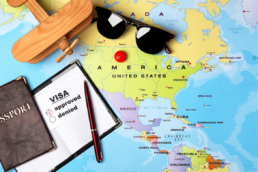In an effort to make sure that U.S. businesses are in compliance with federal immigration laws, U.S. Immigration and Customs Enforcement (ICE) served another 1,000 Notices of Inspection (NOI), bringing the total number of audits for the year to 2,338.
ICE announced that this latest round of audits emphasizes businesses related to vital infrastructure and critical resources. Though specific company names have not been released, ICE did state that they include large and small businesses in roughly 15 industries that include construction, agriculture, food production, financial services, IT, healthcare, water treatment, postal and shipping, transportation, and commercial nuclear reactors.
Based on allegations and specific claims made against companies to ICE regarding immigration law, businesses were also selected for:
- unauthorized/illegal worker hiring
- unfair wages
- worker exploitation
The number of NOIs issued has steadily grown over the last few years, and the average fines and penalties have also increased. In 2010, ICE reported a record-breaking 2,196 audits. For fiscal year 2009, a total of 1,444 audits were conducted.
ICE fines currently range from $110 to $1,100 per violation, with higher fines being imposed on businesses that consciously employ illegal workers. In addition, if the Department of Homeland Security (DHS) also determines that an employer consciously hired illegal workers, it may impose additional fines ranging from $375 to $16,000 per violation.
Additional penalties may also be imposed for noncompliance with the I-9 process, which can be quite severe, even when omissions and mistakes are unintentional. These penalties can involve civil and criminal charges for intentionally employing illegal workers, disqualification from government work contracts, tax evasion, and participation in identity theft.
Businesses with thousands of employees and in locations spread across geographic regions have been surprised to find that audit notices identify a number of their locations. In the past, if ICE agents performed an audit in one region, companies were not likely to face inspection in another region. This is no longer the case. Julie Myers, ICE chief during the Bush administration, explained that since ICE established an audit office outsideWashington earlier this year, targeting large businesses with multiple locations has increased.
Companies participating in E-Verify have also been surprised by audit notices. Participation in E-Verify does not exempt a company from being audited.
Once a business receives an NOI, they have three days to prepare for their meeting with federal officials. During the meeting, officials review completed company I-9 forms for every current and recently terminated employee. Employers may also be asked to provide payroll and other employee documentation for review.
Ready to have Berardi on your side?
Whether you’re a business looking to hire or a professional hoping to relocate, immigration law can be complicated. But you don’t have to do it alone. Put our experience to work for you.


